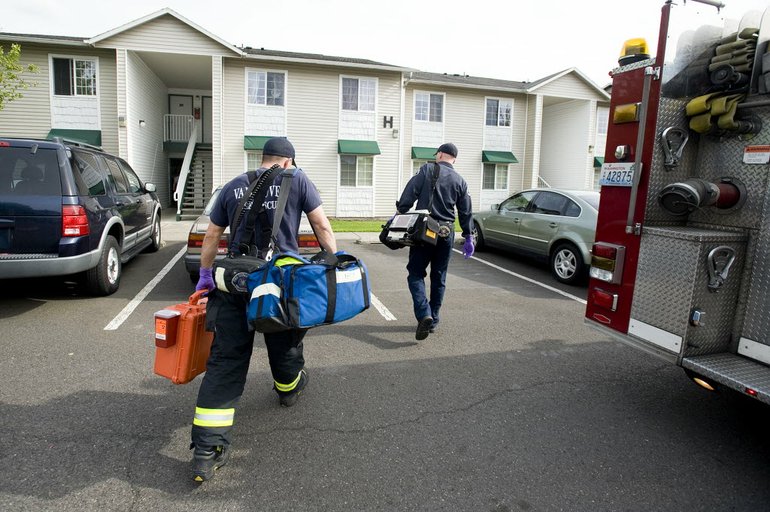Vancouver Fire Chief Joe Molina released the department’s 2010 performance statistics Monday. Here are a few key figures:
Number of calls in 2010: 23,113.
Number of medical calls: 18,811, or 78 percent of total call volume.
Structure fire calls: 224.
Percentage of urban/city calls answered within 5 minutes: 49 percent (down from 71 percent in 2009).
Vancouver Fire-Arson Team arrest and conviction rate: 51 percent (up from 21.4 percent in 2009).
Overtime costs: $1.33 million (down from $2.38 million in 2009).
Last year was a “dynamic” one for the Vancouver Fire Department, its new chief said Monday as he released a snapshot of the department’s 2010 performance.
Response times went up, while overtime costs went down. Two fast-response rescue units were pulled from duty, while a new station opened its doors.
Arson convictions were nearly four times higher than the national average in 2010. Overtime costs dropped by 44 percent, but 24 firefighters and 11.5 full-time administrative staff are no longer working there.
Vancouver Fire Chief Joe Molina released the department's 2010 performance statistics Monday. Here are a few key figures:
Number of calls in 2010: 23,113.
Number of medical calls: 18,811, or 78 percent of total call volume.
Structure fire calls: 224.
Percentage of urban/city calls answered within 5 minutes: 49 percent (down from 71 percent in 2009).
Vancouver Fire-Arson Team arrest and conviction rate: 51 percent (up from 21.4 percent in 2009).
Overtime costs: $1.33 million (down from $2.38 million in 2009).
Facing budget cuts, Vancouver eliminated its two medical response-only units, which, along with a change in calculating response time, dropped the percentage of urban calls answered within 5 minutes from 71 percent in 2009 to 49 percent in 2010.
“It was a very dynamic year,” Fire Chief Joe Molina told the Vancouver City Council on Monday night. “Rescue 3 (one of the medical response-only units) had a huge impact because Station 3 (in Vancouver Heights) is our busiest in the system.”
Overall, response times in 2010 were slower by 30 to 35 seconds. That does not include changes in response times due to the loss of Fire Station 6 in central Vancouver, which closed at midnight Jan. 1, and will affect 2011 statistics. The system is running an additional 15 to 20 seconds slower without Station 6, Molina said Monday.
Medical calls make up the vast bulk — 78 percent — of the department’s work, said Molina, who took the helm of the department early this year following the retirement of longtime Chief Don Bivins.
As a result, the city is now working with other area fire districts on completely overhauling the way fire departments handle emergency medical calls.
“If I do my simple math real quick here, (fires) are like 1 percent of our calls,” Mayor Tim Leavitt said. “Why are we not called the Vancouver Medical Response Unit?”
Molina said that across the U.S., fire departments have seen medical calls vastly outpace structure fires. Still, emergency medical service is a “business we need to be in,” he said. “But we need to be in it smart.”
The county’s new GPS system has helped keep response times in check, as it sends the closest unit to an emergency, regardless of which agency it is, the chief said. Also, the department last year stopped sending city firefighters and paramedics to low-priority calls, instead dispatching private contractor American Medical Response to the call alone.
That gave Councilor Bart Hansen pause Monday. “So you’re relying on a person that’s distressed to tell us the situation, to know which unit to send?” Hansen asked.
Molina said that was the case, but more changes in the way calls are triaged could offer up some of the best savings. At this point, nothing is off the table in discussing ways to overhaul the medical-response system, including roving units or single-person medical-response vehicles, he said.
As it becomes clear that the city must ask voters to approve a public safety or EMS levy, City Manager Eric Holmes said it’s important the department “exhaust those opportunities” for more efficiency before the city asks for more money.
Andrea Damewood: 360-735-4542 or andrea.damewood@columbian.com or www.facebook.com/reporterdamewood or www.twitter.com/col_cityhall.



